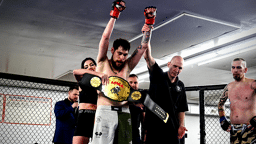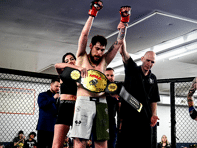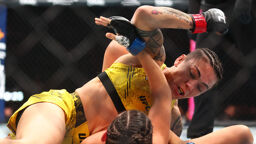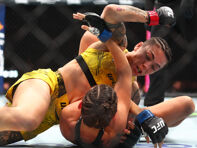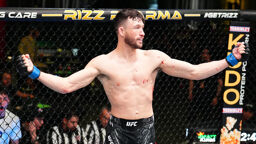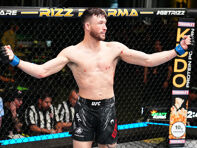All month long, Outsports is revisiting key moments in gay, lesbian, bisexual, transgender and queer sports history as part of LGBTQ history month. Today is also a federal holiday named for Christopher Columbus, and in many towns, cities and states across the U.S., a different holiday is celebrated: Indigenous People’s Day, to honor the contributions of Native Americans.
While I wrote this story primarily to show respect for out athletes among the First Nation peoples, I’ll also touch upon some Italian as well as a moment in Spanish LGBTQ sports history before all is said and done.
In November 2018, Outsports co-founder Jim Buzinski wrote about a former athlete who is both a member of our community and a member of the Ho-Chunk Nation winning election to Congress. Here’s an excerpt:
Lesbian, Native American, ex-MMA fighter Sharice Davids elected to Congress

Sharice Davids, a Native American and openly lesbian who was a mixed martial arts fighter, won a U.S. House seat in Kansas on Tuesday, defeating incumbent Kevin Yoder.
Davids beat Yoder, a four-term Congressman, in the suburban Kansas City district, 53% to 43% in an upset.She is the only LGBTQ former athlete running for a federal office.
During the campaign, Davids embraced who she was and did not try to hide her sexual orientation.
”We are going to elect more women this year, we’re going to elect more people who are L.G.B.T., we’re going to elect more people who are people of color. This midterm election cycle is our opportunity to demonstrate who we are as a country,” she told the New York Times this summer.
The Kansas City Star reported:
Roughly a month before Election Day, Davids paid a visit to Q-Space, an LGBT youth group of 30 young people that meets weekly at Saint Andrew Christian Church in Olathe, Kansas.
Davids talked to the kids about coming out to her family, listened to their stories about bullying and offered words of comfort, said Cassandra Peters, the youth group’s director.
“She took time to hug each and every one of them and take a picture with them,” Peters said. “If they wanted a sign, she autographed it. And it was just so comforting for them to think this person is a politician and cares about them.”
As an MMA fighter, Davids had a 1-1 record and last fought in 2014.
In June 2014, co-founder Cyd Zeigler wrote an op-ed in which he came out as having Native American heritage, after explaining that he did not understand the objections to the name of the Washington, D.C. football team, the “Redskins.” His op-ed is excerpted below:
I don’t understand the issue with ‘Redskins’ – and that’s the problem

I don’t understand why so many Native Americans are pissed off about the “Redskins” nickname. I’d jump at the chance to have the gay community somehow associated with Robert Griffin III.
But this is not my call to make. I can’t tell someone whose ancestors survived genocide only to be kicked off of their homeland how she should feel about this word. I can’t decide for someone who grew up on reservations with high rates of unemployment and alcoholism whether he should feel OK every autumn Sunday when the “Redskins” are plastered all over the TV — Particularly since they haven’t been very good for the last 20 years.
Instead of telling them how they should feel, it’s my job to listen. My great-grandmother may have been Native American, but I never got to meet her. I was never able to ask her about the bias and discrimination she faced because of the color of her skin.
Now is my chance to learn something about my family’s history, the power of images, and the lives of other marginalized Americans I should know a hell of a lot more about.
Starting in January 2009, the very hetero men behind Italy’s soccer team made it clear: there were no gays on their team. Here’s an excerpt from a story Jim wrote, headlined:
Coach: No gay players in Italian soccer

The coach of Italy’s national soccer team, Marcello Lippi, says there are no gay players in the Italian league, and haven’t been in his 40 years in the sport, the Italian news agency ANSA reports.
’’I believe there aren’t any gays among soccer players,’’ Lippi told the gossip website KlausCondicio.
In a career spanning 40 years on the field and off, the World Cup winning coach said he had never personally met a gay player or heard of one.
But he said some players might have ‘’tendencies’’ they were forced to hide because of macho locker room culture.
But by May 2014, at least one Italian politician revealed he knew gays on the nation’s World Cup soccer team. Cyd wrote this:
Italian TV personality and politician Alessandro Cecchi Paone claims he knows of gay men on Italy’s 30-man provisional World Cup squad. From Football Direct News:
He told the IBTimes: “Unfortunately the football world is a very homophobic universe, a place where machismo has to be exhibited.
”I can assure you that within the locker rooms the sexual orientation of players is known and accepted.”
He added when asked about homosexual players in the Italy squad: “Yes, there are. Don’t ask me for names, because they are covered by privacy laws and it would also be in bad taste.”
The key there is that the players are out to their teammates and it’s not an issue. It’s a theme we’ve heard over and over and over and over and over in sports. Teammates of gay athletes just don’t care that one of the guys is gay.
Finally, here’s the story of a Spanish sports historymaker, as told by Cyd in September 2011:
María José Martínez-Patiño kicked off Spanish track team, titles stripped

For Spanish hurdler María José Martínez-Patiño , the journey to prove her womanhood in the world of sports was costly. In 1983 she competed in the World Track & Field Championships in Helsinki, Finland; It was there she “passed” her first gender test and received a Certificate of Femininity. Two years later at the World University Games in Kobe, Japan, she forgot her certificate and had to take a gender test again. This time, she failed the test and was not allowed to compete.
Everyone kept the situation quiet, and in January 1986 she was told to feign injury and opt out of the Spanish national championship. She refused and won the 60m hurdles. Almost immediately her story was leaked, she was thrown off the national team, and her national records were erased from the record books. From her personal account of the weeks that followed:
I was expelled from our athletes’ residence, my sports scholarship was revoked, and my running times were erased from my country’s athletics records. I felt ashamed and embarrassed. I lost friends, my fiancé, hope, and energy. But I knew that I was a woman, and that my genetic difference gave me no unfair physical advantage. I could hardly pretend to be a man; I have breasts and a vagina. I never cheated. I fought my disqualification.
Two years later, the International Association of Athletics Federation, the world’s track & field governing body, gave Martínez-Patiño the green light to compete again. By then it was too late: Her time away from the sport, and the mental toll of her fight to compete, had killed her chances. She missed the 1992 Barcelona Olympics by one-tenth of a second.
Her plight brought some much-needed attention to the issue of gender testing, which helped lead to the end of mandatory tests a decade later. It was one of the last high-profile bannings based on the gender test in track & field until Caster Semenya 20 years later (per Zwischengeschlecht.org).
For more information:
- Martinez-Patino’s personal account
- A layman’s account of Martinez-Patino’s intersex medical condition
Tomorrow — and every day in October — we’ll look back at another moment in LGBTQ sports history.









